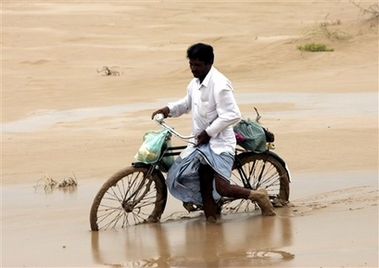Cyclone Gonu blamed for 23 deaths
(AP)Updated: 2007-06-08 01:00
 A man pushes his bike in the mud in Al Swadi area about 100km north west of Muscat, Oman, Thursday June 7, 2007. Residents of Muscat are recovering from the destruction after Cyclone Gonu battered Oman's coast on its path toward the world's most important crude oil tanker route. [AP]  |
Cyclone Gonu battered Oman's coast Thursday, flooding highways and tearing down trees and power lines but sparing the region's oil industry. At least 23 people were killed in deaths related to the cyclone ¡ª a rarity in the Middle East.
But as Gonu headed from Oman to the southeastern Iranian coast, it continued to lose steam, weakening to tropical storm strength, according to the U.S. military's Joint Typhoon Warning Center.
Oil analysts said the weakening storm's effect on the market was minimal.
The center predicted Gonu would make landfall on the southeastern Iranian coast late Thursday. But it was likely to spare Iran's offshore oil installations that are more than 120 miles to the west, the center and oil officials said.
At least 20 deaths were blamed on Gonu in Oman, including members of police rescue squads, and 24 were reported missing, said Royal Police spokesman Abdullah al-Harthi. Rescue teams searched devastated areas in helicopters and boats, he said.
Across the Gulf of Oman, Iranian state television reported that a resident of the port city of Bandar Abbas was killed in a car accident Wednesday due to poor visibility from the storm.
Two provincial government workers bringing emergency supplies to a flooded area also were killed when a river overflowed and their truck flipped in Jask, a town 155 miles southeast of Bandar Abbas, state TV's Web site said.
The storm caused little damage to Oman's relatively small oil fields. But raging seas had prevented tankers from sailing from Omani ports, effectively shutting down the country's oil exports, said Nasser bin Khamis al-Jashimi of the Ministry of Oil and Gas.
"It looks like Oman has taken its precautions and so far, really, I haven't heard of any disruption to the flow of oil," said Muhammad-Ali Zainy, senior energy analyst at London-based Center for Global Energy Studies.
Brent crude fell on confirmation that Oman's main oil port hadn't suffered major damage from Gonu. In London, July Brent crude futures dropped 17 cents to $70.85 a barrel on the ICE Futures exchange.
The port of Fujairah in the United Arab Emirates reopened Thursday after it suspended all refueling and ship-to-ship supply operations at the world's third-largest shipping fuel center.
On Thursday, the storm had sustained winds of 41 mph, less than half its strength of 95 mph just 24 hours earlier, the Joint Typhoon Warning Center said. It was centered about 98 miles north of Muscat and was projected to weaken as it moved through the Gulf of Oman toward Iran.
Even with the weaker winds, Gonu ¡ª which means a bag made of palm leaves in the language of the Maldives ¡ª is believed to be the strongest cyclone here since record-keeping started in 1945.
In the capital of Muscat, highways and yards were flooded, and downed trees and power lines were scattered in the high waters. Residents washed cars in the flooded streets, while others snapped pictures.
Muscat's mountain backdrop added to the problem. The torrential rain that poured onto the bone-dry peaks flowed into canyons and dry riverbeds that channeled the raging water directly into the city.
"The capital Muscat became a lake," al-Harthi told Oman TV.
In coastal city of Sohar west of Muscat, violent waves continued to crash the shore as several residents returned to their homes Thursday after being evacuated.
"We all went to the school last night, and I came back to look at the house. Twice the water came into my house, and maybe the tide will come in again," said fisherman Salem Hassan al-Mukblai, 40, as he and his two sons tried to tie a downed fruit tree to a fence surrounding their house.
Shareefa bint Khalfan, Omani minister of social development, said more than 20,000 people were evacuated Wednesday and housed in government-provided dwellings stocked with medicine and supplies. Oman's eastern provinces have been cut off, with heavy rains making the roads unusable and communication lines severed.
In Iran, authorities evacuated hundreds of people living in the port city of Chabahr on the coast of the Gulf of Oman, believed to be next in the cyclone's path.
But the heavy storm, which caused trees to fall and windows to smash, eased Thursday morning, subsiding into light rain and wind.
"Thanks to God, people are back in the bazaars and streets of the city," said Abbas Jafari, a 47-year-old taxi driver. "Yesterday was terrible. I had never seen such a storm in my life."
Iran's state broadcasting company said on its Web site that some small villages in Sistan and Baluchistan province, on the Gulf of Oman, were still encircled by floods and authorities used helicopters to drop emergency supplies to them.
The storm affected power and telephone lines elsewhere in the province, but caused no major damage, provincial governor Habibollah Dehmardeh told the official IRNA news agency.
As a precaution, the Bandar Abbas oil refinery, which supplies the local petroleum market, closed jetties that receive oil from tankers, the Web site of Iran's Oil Ministry reported. The refinery was working as usual Thursday, the report said.
|
||
|
||
|
|